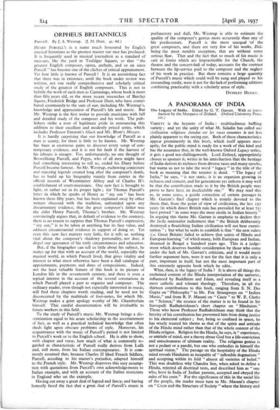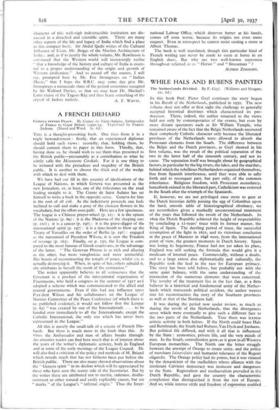A PANORAMA OF INDIA
The Legacy of India. Edited by G. T. Garratt. With an intro- duction by the Marquess of Zetland. (Oxford University Press. los.)
VARIETY is the keynote of India : multitudinous baffling variety ; and yet the unity of what M. Saladin has called unc civilisation religieuse etendue sur les races ennemies is not less plainly apparent to the seeing eye. Both of these characteristics appear prominently in this book, which itself appears most aptly, for the public mind is ready for a work of this kind and has the assurance that, in the well-known Oxford Legacy series, it gets a good ten-shillingsworth. Lord Zetland, appropriately chosen to sponsor it, writes in his introduction that the heritage of India derives its richness from diverse races and many epochs, but warns us not to take the word " legacy " in the title of the book as meaning that the testator is dead. " The legacy of India," he says, " is not static, it is an organism growing in richness and content, and for generations yet unborn it may well be that the contribution made to it by the British people may prove to have been an incalculable one." - We May read this as, in some sense, a gentle correction of certain passages in Mr. Garratt's final chapter which is mainly devoted to the thesis that, from the point of view of civilisation, the last 15o years (in which direct British rule has prevailed for at least 75) have proved " in some ways the most sterile in Indian history." In arguing this theme Mr. Garratt is emphatic to declare that the facile nationalist indictment that " the British deliberately destroyed a flourishing Indian civilisation will not bear exami- nation " ; but what he seeks to establish is that " the new rulers (i.e. Great Britain) failed to achieve that union of Hindu and European learning "of which many, both EurOPean and Indian, dreamed in Bengal a hundred years ago. This is a judge- ment which deserves humble consideration by those who come under the lash of Mr. Garratt's criticism, and it would merit further argument here, were it not for the fact that it is only a part, important in itself, but not the most important part of this extremely apposite book which he edits.
What, then, is the legacy of India ? It is above all things the enshrined content of the Hindu interpretation of the universe, influenced by Buddhism and Islam, and revealing itself as a most catholic and tolerant theology. Therefore, in all the thirteen contributions to this book, ranging from S." N. Das Gupta on "Philosophy " to Mr. Fox Strangways on " Indian Music," and from R. P. Masani on " Caste " to W. E. Clarke on " Science," the essence of the matter is to be found in Sir Sarvepalli Racilutkrishnan's short chapter on " Hinduism." Those who know Professor Radhakrishnan may think that the brevity of his contribution has prevented him from doing justice to his elemental subject ; but, being so confined in space, he has wisely treated his theme as that of the spirit and attitude of the Hindu mind rather than that of the whole content of the Hindu religion. Religion for the Hindu, he says, is" experience, or attitlide of mind, not a theory about God but a life-conviction and consciousness of ultimate reality. The religious genius is not a pedant or a pandit, but one who embodies in himself the spiritual vision." The passage on the hospitality of the Hindu mind reveals Hinduism as incapable of " inflexible dogmatism " and accepting within its fold " almost all varieties of belief." This was doubtless why Chandra Sen, when asked to define a Hindu, rejected all doctrinal tests, and described him as " one who, born in India of Indian parents, accepted and obeyed the rules of his caste." For the significance of this in the social life of the people, the reader must turn to. Mr.. Masani's chapter on " Caste and the Structure of Society " where the history and
character of this well-nigh indestructible institution are dis- cussed in a detached and scientific spirit. There are many other aspects of the life and legacy of India which find a place in this compact book. Sir Abdul Qadir writes of the Cultural Influence of Islam, Mr. Briggs of the Muslim Architecture of India ; and, as if to justify the whole volume, Mr. Rawlinson is convinced that the Western world will increasingly realise " that a knowledge of the history and culture of India is essen- tial to a proper understanding of the origin and growth of Western civilisation." And to round off the matter, I will say, prompted here by Mr. Fox Strangways on " Indian Music," that I hope the B.B.C. may some day give Mr. Strangways a minuscule share of the period sometimes occupied by Sir Walford Davies, so that we may hear Dr. Mackail's Latin vision of the Tagore Rag and thus learn something of the



































































 Previous page
Previous page